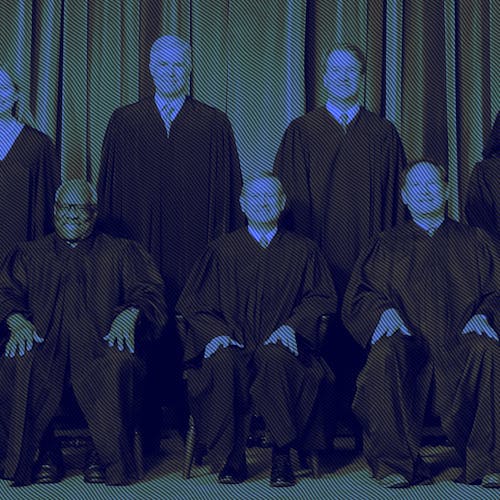EDITORIAL: Do not pack Supreme Court, add term limits instead
Expanding Supreme Court size could set abused precedent

If this year’s political theater has not worn you out yet, get ready for this coming week, as Republicans and Democrats are set to square off during Judge Amy Coney Barrett’s Supreme Court confirmation hearing.
“Judge Amy Coney Barrett will tell the Senate Judiciary Committee on Monday that serving on the U.S. Supreme Court ‘was not a position I had sought out, and I thought carefully before accepting,’” according to NBC News. "The confirmation hearings for Barrett's nomination to the high court are scheduled to begin on Monday at 9 a.m. ET and last through Thursday."
The hearings have been overshadowed by the coronavirus disease (COVID-19) pandemic and a multitude of other chaotic news events but are nonetheless important. Adding to the drama is the fact that Republican senators are engaging in an act of utter hypocrisy by voting for a Supreme Court Justice during an election year.
“Four years after Senate Republicans declined to take up President Barack Obama’s nomination of Merrick Garland in a presidential election year because they said voters should decide the matter, they’re now casting that standard aside and pressing forward,” according to The Washington Post.
The Democratic response to this hypocrisy has been, understandably and predictably, outrage, according to Politico. With Sen. Kamala Harris (D-Calif.) serving on the Senate Judiciary Committee, we can expect Barrett to be grilled with tough questions.
But some Democrats have been even more aggressive in their response to this matter. Many prominent party members, both inside and outside the sphere of public office, have advocated for packing the court, according to The New York Times.
Take Sen. Ed Markey (D-Mass.), who pushed for expanding the size of the Supreme Court immediately after former Justice Ruth Bader Ginsburg’s death.
“In tweets, statements, and speeches over the weekend, Markey called on Sen. Mitch McConnell (R-Ky.), the Republican majority leader, to follow the ‘precedent’ he set in 2016 when he blocked President Barack Obama’s nomination of Judge Merrick Garland," according to Politico. "But if Republicans disregard that principle and fill Ginsburg’s seat with President Donald Trump’s soon-to-be announced nominee, the Massachusetts Democrat said his party ‘must abolish the filibuster and expand the Supreme Court’ if they regain power.”
For those unaware, “packing the court” is the act of adding justices to the Supreme Court and, presumably, filling it with nominees who share the party’s viewpoint.
If former Vice President Joe Biden wins the election, the idea that some Democrats are clamoring for is for Biden to expand the size of the Court and fill it with Democratic justices to offset the — likely inevitable — confirmation of Barrett.
In fact, during last week’s vice presidential debate, Vice President Mike Pence pushed Harris on the issue, but she gave a non-answer.
“‘Are you and Joe Biden going to pack the Court?’ (Pence) asked (Harris) … Harris refused to answer the question directly. Instead, she took a historical detour to 1864, explaining why Abraham Lincoln didn’t appoint a new Supreme Court justice shortly before he was up for reelection,” according to The Atlantic.
Biden himself refuses to provide a direct answer to the question, and even some Democrats are worried about the implications.
“‘You'll know my opinion on court packing when the election is over,’ Biden said, standing inside an airplane hangar at the Phoenix airport alongside Harris in Arizona on Thursday. The deflections from the Democratic ticket have also given the Trump campaign an opening to hammer home the Biden campaign's refusal to clarify its position on court packing,” according to ABC News.
Packing the court is a bad idea for a few reasons. First, you would have to be naive to believe that Republicans would not abuse such a precedent and further pack the courts themselves once they retain power.
Republicans using Democrat-set precedents helped get us into this situation in the first place, such as when former Sen. Harry Reid (D-Nev.) eliminated the 60-vote threshold for overcoming a filibuster, which Republicans eventually used to get their Supreme Court picks confirmed, according to Time Magazine.
In addition, the American public is against the idea of court packing, according to Forbes. Such a move by the Democrats would curtail the will of the public and be deeply unpopular, which could harm the Democrats’ standing and power in the long term.
A better move is for term limits on the Supreme Court. This would clarify the process and avoid chaos when justices die, and presidents would each get a consistent amount of picks for the bench, according to CNN. The partisanship of the process would diminish significantly, and there would be no precedent that either party could abuse at will.
Do we want Justices serving decades? Ginsburg was on the bench for approximately 30 years, and Justice Clarence Thomas has served since 1991, according to Fox News. Times change, and the Supreme Court needs to change with them.
Term limits are a way to do that, and they are not biased toward the Republican nor Democratic parties. They simply would exist to serve the American people and form a more accurate, updated court.
But it is disappointing that the system has been designed poorly thus far. There is no reason any one individual should have a lifetime seat in such an important role and such a system promotes stagnation. No nine people should have that much power over the populace.
Rather than support court packing, support politicians who wish to introduce term limits and do what you can to propel them to victory.
The Daily Targum's editorials represent the views of the majority of the 152nd editorial board. Columns, cartoons and letters do not necessarily reflect the views of the Targum Publishing Company or its staff.



